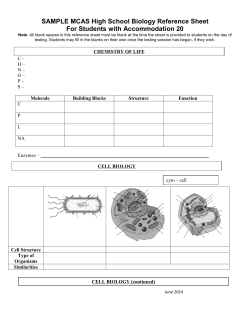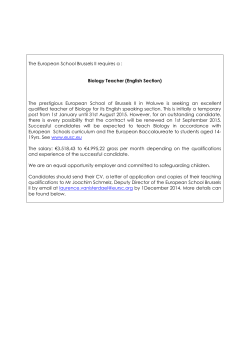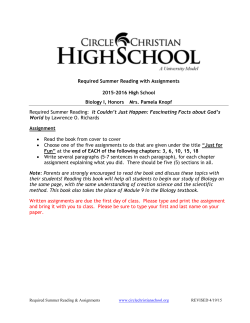
AP BIOLOGY - Sanger High School
Sanger High School AP Biology Summer Assignment: 2014-2015 Dear Student, Welcome to AP Biology! I hope you are looking forward to an exciting, yet challenging year. This is a college level course; it will be rigorous and demands your time both in and out of the classroom. To get you off to a great start, your work for this course will begin during the summer so we can finish the curriculum in time for the AP exam. Students failing to complete required summer work will have their assignment grade dropped a full letter grade on the first day it is late. Three days after the due date the assignment will be graded as a zero. Missing the required due date will significantly reduce your fall semester final grade in AP Biology. It is important to remind you that students earning a grade of D or F at the two-week mark may be removed from AP Biology enrollment. The AP exam occurs in mid-may and you will be prepared for this exam! With that said, work hard, stay focused, and be sure to get your summer work completed so you can continue to be enrolled in AP Bio for the upcoming school year! Doing your work will prepare you for success (in understanding and your grade) during the first portion of our class. FYI—if you lose this page you can find it our Edmodo.com class page. Why summer work? The College Board Objectives outline for AP Biology is expansive. We have the months of September-March to complete the curriculum (April is saved for review) prior to AP testing in May. In order to cover ALL of the curriculum we must dive into our learning during the summer months. Thank you, Mr. Aalto davin_aalto@sanger.k12.ca.us Our summer assignment is due on the first day of class! This assignment accomplishes several objectives. The objectives are as follows: 1. Your completing this work will allow much more class time to be devoted to areas of Biology that will be new and difficult for most students. 2. This work will be an introduction to the College Textbook and the difficulty level of the work you can expect. 3. You should read no more than a few pages in one sitting. Attempt to answer questions without quoting the textbook. If you cannot write the answer in your own words, you probably do not understand the material. 4. The chapters covered in the summer work will be summarized the first couple of weeks of school. Please review the material shortly before returning to school. The College-level Biology textbook is written to be read and re-read. If you do not understand, you should stop and re-read until you understand. Also, see if you can find an animation of the concept on-line so you can “see” the concept in another form. 5. Suggestion…Summer work is only 4 chapters. Do one chapter a week starting Monday June 13th and you will be finished BEFORE the end of July. Go back and review everything the two weeks prior to the start of school in August and you should be set for our first quizzes and exams! Adapted with permission from K. Whittaker CUSD Most (but not all) of your summer work will cover basic science, chemistry, and biochemistry. Many of the concepts that you will cover in this summer work build on all the stuff you already KNOW or have studied before. We are just going to go more in depth and learn the technical words and concepts. What is the “Assignment?”: 1. Enter your contact information into Mr. Aalto’s google form database http://goo.gl/H89VdZ 2. Visit the AP Biology Edmodo site: www.edmodo.com and sign up to our class web page. a. To get ready to use the AP Biology Edmodo site, you must sign up by clicking “I’m a Student” at http://www.edmodo.com. *note: if you already have an edmodo.com account, just login and join a new group. b. You must then enter GROUP CODE 8xzh3c and then input your first name, last name, and username. You don’t need an email address to sign up. (Please make sure your names are appropriate for academic environment) (DUE BEFORE LAST DAY OF SCHOOL) 3. Check out the AP Biology textbook (or required summer resource) from the library before the end of the school year. (DUE BEFORE LAST DAY OF SCHOOL) a. Mader: Biology 9th Edition 4. Read each assigned chapter (IN THE ORDER listed below). You will not want to do this…DO IT!!! 5. In Cornell Notes style for EACH chapter… a. List each black bold word from the chapter on the left side of the page and then write a clear and concise definition of the word on the right side of the page (some words will be deleted from the list see chapter specific notes below). 1. DO NOT USE THE GLOSSARY! Write the definitions in your own words. No points will be awarded for any definitions copied from the glossary. 2. Be thorough. You may consider doing this on a computer and saving your work. 3. We will have vocab/reading quizzes/test on the summer work when you return to school. You have been warned. 6. For EACH chapter… a. Write a ½ page summary of the chapter including the two most important BIG IDEAS (in your opinion) that were taught in the chapter. 1. This should be right below where you finish the Cornell Notes vocab for the given chapter. 7. Re-read EACH Chapter and in Cornell Notes style for EACH chapter… a. Write each “Reviewing the Chapter” questions and answers. These questions are found at the end of each chapter. 1. List the question on the Left side of the page (you can paraphrase them), and list the answer on the Right side of the page. 2. Each chapter will have a different number of “Reviewing the Chapter” questions depending on the length of the chapter. 3. Do the work on your own without using the appendix. 8. Compile your work in a binder in the following order for each chapter: a. Chapter tab-Chapter # and Topic listed b. Chapter Cornell Notes Vocab c. Chapter Summary Adapted with permission from K. Whittaker CUSD d. Chapter Cornell Notes Concept Checks e. Turn in your work on the first day of class. The Summer Work Chapters: Intro to Biology, Chemistry, and Animal Behavior **In THIS order! Chapter 1 A View of Life (finish by July 19) adaptation, binomial nomenclature, biodiversity, control, deductive reasoning, emergent property, evolution, experimental variable, homeostasis, hypothesis, inductive reasoning, natural selection, responding variable, scientific process, scientific theory Chapter 2 Basic Chemistry (finish by July 26) atomic mass, atomic number, calorie, covalent bond, electronegativity, hydrogen bond, hydrophilic, hydrophobic, ion, isotope, nonpolar covalent bond, octet rule, polar covalent bond, solute, solution Chapter 3 The Chemistry of Organic Molecules ATP, Carbohydrate, Cellulose, Coenzyme, Complementary base pairing, Dehydration reaction, Denatured, Enzyme, Functional group, Hydrolysis reaction, Monomer, Organic molecule, Peptide bond, Phospholipid, Polymer Chapter 45 Animal Behavior (finish by June 14) Altruism, Associative learning, Behavior, Classical conditioning, Communication, Cost-benefit analysis Dominance hierarchy, Fitness, Fixed action pattern (FAP), Imprinting, Inclusive fitness, Kin selection, Learning, Operant conditioning, Pheromone, Reciprocal altruism, Sexual selection, Society, Sociobiology, Territoriality, Territory Adapted with permission from K. Whittaker CUSD
© Copyright 2025









